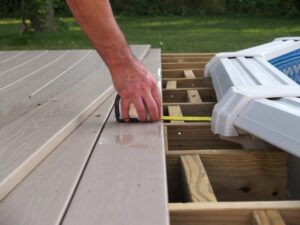In today’s rapidly evolving technological landscape, the intertwining of modern methods with age-old traditions is evident everywhere—even in Deck Building in Bismarck, ND. Sacred spaces, once solely the domain of traditional architectural methods and materials, now find themselves at the intersection of tradition and technology. But as we merge the old with the new, questions of ethics and preservation arise. How do we ensure that these tools respect and amplify the sanctity of these spaces rather than detract from it?
 Material Innovation & Sustainability
Material Innovation & Sustainability
One of the most evident impacts of technology on deck building in sacred spaces is in the materials used. We now have access to eco-friendly and sustainable materials, thanks to technological research and development. For instance, composite materials that last longer and resist decay better than traditional wood can be employed. While this might seem like a straightforward boon, there’s a deeper ethical consideration here. If a religion preaches the principle of stewardship of the Earth, then using sustainable materials is not just a matter of practicality but also a manifestation of that faith.
Smart Decks & Integration Challenges
The notion of ‘smart homes’ has transitioned into ‘smart decks’. Features like automatic lighting that adjusts for events, weather-responsive shading systems, or even built-in audio for calls to prayer or meditation are no longer in the realm of science fiction. However, integrating these technologies into sacred spaces can be ethically tricky. While they offer convenience, they might be seen by some as a distraction or even a dilution of the spiritual experience. The challenge is how to incorporate these features in a way that respects and enhances the sanctity of the space.
 Cultural and Historical Preservation
Cultural and Historical Preservation
While technology offers innovative solutions for deck building, it poses an ethical dilemma when it comes to preserving the historical and cultural essence of sacred spaces. Modern materials and tools can replicate ancient carvings and designs with precision, but do they carry the same spiritual weight and history? The politics of preservation becomes even more complex when we think about the communities that might resist technological interventions, viewing them as a disruption to their heritage.
Conclusion
Technological advancements undoubtedly offer exciting possibilities for deck building in sacred spaces, from sustainable materials to smart features. However, as with all tools, their ethical application lies in the hands of those who wield them. It becomes imperative for architects, community leaders, and technologists to engage in dialogues, ensuring that these advancements serve the spiritual, cultural, and ethical imperatives of the communities they are meant to uplift.
